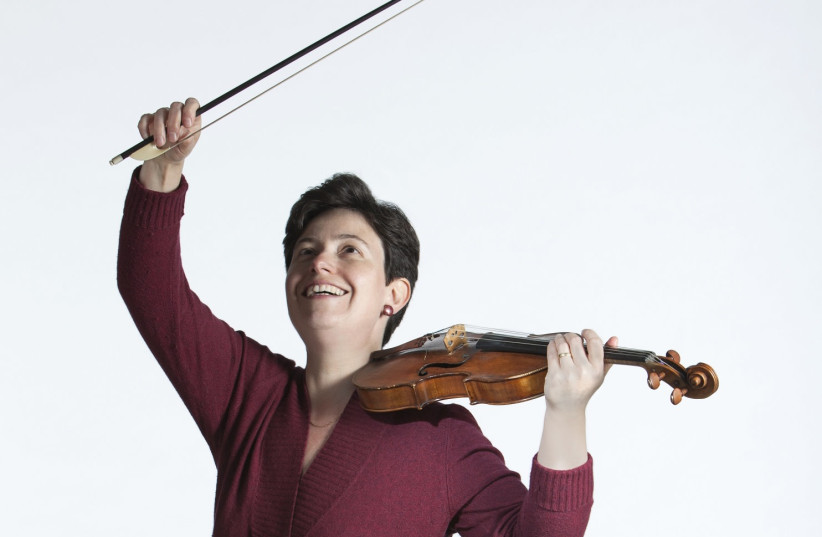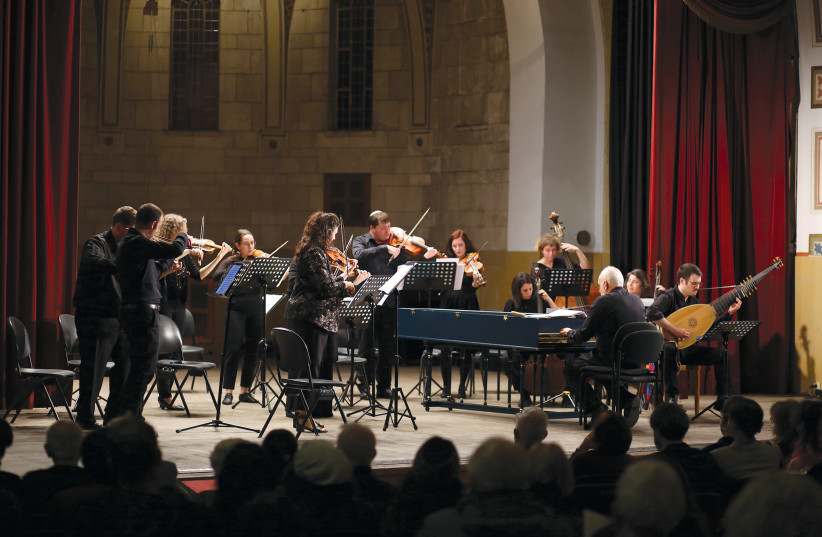As most parents will attest, getting through their kids’ teenage years can be quite a challenge, for both parties. Some youngsters, looking to have their say in this world and, in the process, kicking out against the members of the older generation who are perceived to enforce their values on the younger lot, go off the deep end for a while.
Kati Debretzeni’s teenage revolt was of a far more cultural and socially amenable nature.
“My rebellion was to go for historical music,” she laughs. “When I was young that really was a rebellion,” adds the 50-year-old Romanian-born, British-based Israeli violinist.
Debretzeni has been living in England for half her life, relocating there at the age of 25. She made aliyah together with her family from Cluj, at the age of 15, and gained a solid education here, including completing a BA at the Tel Aviv Academy of Music, before moving to England to take a master’s degree and then landing herself a good job in her chosen field.
Next week she will bring that accrued experience and expertise over here when she makes her first professional visit to Israel since the COVID scare began. The “pretext” for her Israeli foray is a conducting and playing berth with the Jerusalem Baroque Orchestra (JBO) which takes in four concerts, February 12-15, in Haifa, Jerusalem (YMCA), Tel Aviv and Ness Ziona. The series homes in on the Italian strain of baroque music and, unsurprisingly, features works by Vivaldi, but also by some lesser composers, such as Bagio Marini, Giovanni Legrenzi and Vivaldi contemporary Tomaso Albinoni.

She is bringing some impressive baggage with her. After completing her master’s degree at the Royal College of Music, under the tutelage of venerated violin teacher Catherine Mackintosh and distinguished violinist and professor Walter Reiter, she joined the English Baroque Soloists founded and conducted by Sir John Eliot Gardiner. It was an offshoot of the Monteverdi Choir and Orchestra, although, in contrast to its parent ensemble, its members play period instruments.
Debretzeni is also a long-serving member of the Orchestra of the Age of Enlightenment and is one of the ensemble leaders.
“After I finished my master’s I learned the profession,” she says, alluding to the inestimable rewards of on-the-job training. “You have to learn your instrument, and to learn to play in an orchestra.” It was a brass tacks passage for the young violinist. “You have to learn what to play, what not to play, and what energy to invest in your playing. You have to learn not to be a passenger in the orchestra. You gain a special sense of the music, and the profession, from the inside. That was a wonderful education for me.”
There was not too much in the way of career vacillations for Debretzeni. She is a fourth-generation musician. Her paternal great-grandfather was a church organist – she is not Jewish on her father’s side. Her grandmother was a violinist, pianist and singer, and renowned educator, and her father was a choir and opera conductor. Her mother also got into the musical act. “She was a pianist with the opera, and worked at the Academy of Music in Tel Aviv for 27 years,” Debretzeni notes.
Clearly, she did not devote too much time or energy to considering the possibility of earning a crust as a lawyer or accountant.
“The truth is I never looked at anything other than music,” she says, although adding that she’d be perfectly happy for the genetic musical line to stop with her. “I really hope my 12-year-old daughter goes for something else,” she laughs.
Not that the youngster lacks the requisite DNA. “She plays cello and recorder really well. But, at the moment, she wants to be a psychologist. We’ll see what happens later.”
Debretzeni did not elaborate on her reluctance for her daughter to follow in her – it must be said – highly successful mother’s footsteps, but, presumably, that has something to do with financial and logistical factors, rather than purely artistic considerations.
WHILE DEBRETZENI’S daytime job choice may have been preordained, her avenue of expression was not. After making aliyah the teenager found her way to the Thelma Yellin High School of the Arts, in Givatayim, where she seamlessly slotted into the mainstream classical side of things.
Her change of genre tack was the result of a favor.
“I had a friend, also a violinist, who was into baroque music and asked me to fill in for him at a rehearsal because he was otherwise engaged,” she recalls. She duly sat in and was immediately drawn to early music. Mind you, she did need a little help with her tuning, and was advised to refit her classical violin by removing the chin rest before she procured a baroque model of her own.

A few years back a violinist in the Barrocade Israeli Baroque Collective told me she made the genre move because she was fed up with having to constantly play vibrato in classical music. At the time that sounded like justifiable grounds for getting into musical endeavor with a lengthier timeline. However, Debretzeni casts a little doubt on the Barrocade player’s reasoning.
“It is not entirely true that you don’t use vibrato in baroque music,” she explains, “if you read what [English-based Italian violinist composer and musical theorist] Francesco Geminiani wrote in 1756 that you have to use vibrato whenever possible. So, that doesn’t really solve the problem of playing vibrato,” she smiles. “But you can, at least, choose when to use it.”
Debretzeni admits to a particular penchant for the music of Bach, one of the most celebrated composers in the history of classical music, whose work continues to draw audiences, and players, from a wide range of musical leanings. Naturally, the English Baroque Soloists conductor was eager to put as much Bach material out there, too. “In 2000 I was fortunate that Sir John performed the entire cycle of Bach cantatas. He was the only one who did the full cycle. That was wonderful. I was also lucky enough that he chose me to be one of the concertmasters.”
OVER THE years the violinist has worked under some of the greatest names on the conducting side of the field. British megastar Sir Simon Rattle has certainly left his imprint on her artistic development. “That was a special experience for me. He not only conveys a sense of special energy and charisma; he also trusts his orchestra.” That helps to engender a sense of well-being among the players, and of being involved in the creative process. “That gives you a feeling of being fully on board. Simon makes you feel that you are a partner in the work. You feel you are in heaven.”
That is a salient point for anyone considering the pros and cons of earning a living as a member of a large orchestra, or opting for chamber work, or smaller groups or even setting their sights on becoming a soloist. “With Simon you feel you can do anything you want. He is an enabler.”
That does not just pertain to the baroque end of the classical spectrum. “We had a great experience with him, with works by Rameau, Haydn, Dvorak, Brahms, Wagner and all sorts. And he enjoys the different shades he gets from the orchestra.”
Debretzeni says that working with different conductors has helped her along her own learning curve. She also notes that classical music is far from straitlaced.
“Take someone like [71-year-old Hungarian conductor] Ivan Fischer. With him there is a lot of improvisation on the stage. You never play the same piece the same way twice. You never know what is going to happen with him. Anything goes,” she laughs. “That is very exciting. You never know how he is going to signal the downbeat [first beat of a musical measure]. He could do that in a thousand and one ways. With him it is like composing in real time.”
That conjures up images of a jazz combo taking some standard any which way, and constantly leaping off at the deep end. That also fits the baroque bill. “The ornamentation you add to the music should never be the same twice,” she declares.
BY NOW it had become clear that Debretzeni is happy to consider a variety of creative options, across a number of disciplines. I learned she has some dance troupes synergies in her backdrop.
That, she says, is a natural development. “I like to vary my work. That is great. Dance is a means of artistic expression through movement, and we express ourselves through music. Neither uses words.”
Then again, surely, there is a fundamental divide to be bridged here. Conveying a story line with, for example, a pirouette or a dash across the stage at high speed is a very different sensorial matter compared with going at one’s violin with hammers and tongs.
Debretzeni says she has no problem connecting with dance and sees the two disciplines as complementary fields. “They are two sides of the same coin. Music and dance have got together since time immemorial. That definitely also applies to the baroque era, especially French baroque among the aristocracy.” But it wasn’t only the – pardon the pun – well-heeled who enjoyed a bit of musically accompanied hoofing. “The common folk also engaged in dancing. Every wedding in the 17th century had music and folk dancing.”
She also feels that temporal gaps are naturally spanned. “I think that you can fuse contemporary dance with baroque music. That is no problem at all.”
It is fair to say that Debretzeni has been champing at the bit for quite some time, and is eager to come back here for another date with the JBO, and conductor David Shemer.
“I am coming home to all my friends,” she says. “There are now, of course, some younger players in the orchestra, but there are some I have known since my student days.”
The principal reason for the furlough, unsurprisingly, is the pandemic-related directives. “I haven’t performed in Israel for over two years. I was due to do something really nice with the Tel Aviv Academy, in December. And then Omicron came along and it was canceled three days before it was supposed to happen. That was frustrating.”
All being well, and Omicron logistics notwithstanding, Debretzeni will make a triumphant return to these parts next week, for the listening and visual pleasure of devotees of baroque music around the country.
For tickets and more information: (02) 671-5888 and www.jbo.co.il
